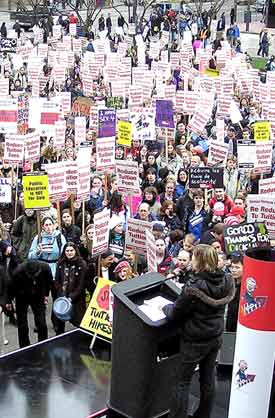 Students protest tuition fee hikes in Vancouver as part of a National Day of Action in February.
Students protest tuition fee hikes in Vancouver as part of a National Day of Action in February.
BURNABY, B.C. (CUP) — While the provincial government makes room for more students at British Columbia’s post-secondary schools, it’s simultaneously making it more difficult for students to afford an education, student leaders say.
“We believe that the real issue facing students in Canada is the financial accessibility of college and university,” Michael Marin, spokesperson for the Canadian Alliance of Student Associations, said from Ottawa. “To us, there isn’t much point in making more spaces if you can’t make sure that students will actually be able to sit in them.”
The government plans to add seats for 25,000 more post-secondary students by 2010. Over the past month, a series of announcements have heralded big changes at universities and colleges around the province. It all started on March 5, when Premier Gordon Campbell announced the government would spend $70 million to develop a new campus for Simon Fraser University in Surrey. Twelve days later, Okanagan University College was split in two. One of its Kelowna campuses will become the University of British Columbia, Okanagan; its other campuses will form Okanagan College.
Next, the province proclaimed that the University College of the Cariboo would become a new university, take over the B.C. Open University and Open College distance education institutions, and assume a new identity. Five Vancouver Island post-secondary institutions “? Camosun College, Malaspina University-College, North Island College, Royal Roads University, and the University of Victoria “? will split funding for 4,000 new seats by 2010, the government declared March 26.
On April 5, the province announced the addition of 700 student spaces to the College of the Rockies and Selkirk College. Furthermore, Selkirk College will swallow up the Kootenay School of the Arts, a private post-secondary institution.
The government claims these moves will increase access to post-secondary education, provide more opportunities for students to study closer to home, and benefit the province’s regional economies. But Geordie Dent, a student union executive at Simon Fraser University, is skeptical that new spaces will translate into better access. He points out the government eliminated the grants program and deregulated tuition fees “? leading to three years of tuition hikes. Dent said he’s also concerned the province is simply mandating universities to accommodate more students without providing enough funding for the new seats. “I think the government is gutting education,” he said, “and cloaking it in a veil of secrecy.”
Dent said he can no longer afford to attend university in B.C., and plans to finish his education in Norway, where students don’t pay tuition fees. He might not be the only one.
Over 10 per cent of undergraduate students responding to a 2003 Simon Fraser University survey said they were very likely to leave or quit their studies if tuition fees increased.

